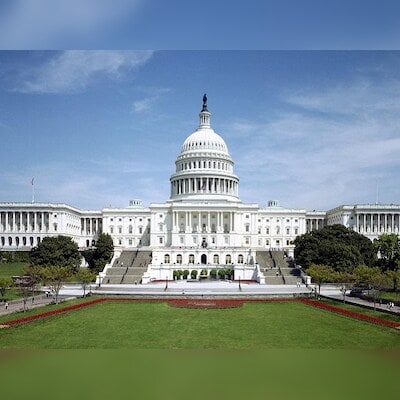)
This bipartisanship is a good outcome for America, Senate Majority Leader Chuck Schumer said moments before the vote. I hope it sets the tone for more constructive, bipartisan work when we return in the fall File Photo: Commons
The US Congress has passed a temporary measure that keeps government agencies funded into December, avoiding a shutdown for now while punting final spending decisions until after the November 5 election.
The Senate approved the measure on Wednesday by a vote of 78-18 shortly after the House easily approved it. The bill generally funds agencies at current levels through December 20. But an additional USD231 million was included to bolster the Secret Service after the two assassination attempts against Republican presidential nominee Donald Trump. Money was also added to aid with the presidential transition, among other things.
The bill now goes to President Joe Biden’s desk to be signed into law.
This bipartisanship is a good outcome for America, Senate Majority Leader Chuck Schumer said moments before the vote. I hope it sets the tone for more constructive, bipartisan work when we return in the fall.
House Speaker Mike Johnson, R-La., billed the measure as doing only what’s absolutely necessary,” a statement directed at members of his own conference concerned about spending levels.
Still, it was a no-go for some Republicans, which forced House GOP leadership to rely on Democratic votes to pass the bill through a process that requires at least two-thirds support from voting members. The final vote was 341–82, with Republicans supplying all the no votes in both chambers. Johnson said the only alternative to the continuing resolution at this stage would have been a government shutdown.
It would be political malpractice to shut the government down,” Johnson said. “I think everyone understands that.
The House floor was largely empty during debate on the measure. Rep. Chip Roy, R-Texas, was the lone critic among the speakers, saying, We end up in a vicious circle every year, the same vicious circle.
Lawmakers in both chambers are anxious to return to their home states and districts to campaign, smoothing the path for passage of the temporary funding fix. But more arduous fiscal negotiations await them at the end of the year.
Under terms of a previous deal to avoid a federal default and allow the government to continue paying its bills, spending for defense and non-defense programs would rise 1 per cent next year.
The Senate has been charting a course to go above that level, while House Republicans have been voting for steep cuts to many non-defense programs, and they have attached policy mandates to the spending bills that Democrats overwhelmingly oppose. So a final agreement will be difficult to reach.
In the meantime, the temporary bill will mostly fund the government at current levels, with a few exceptions like the funding infusion for the Secret Service.
The USD231 million for the Secret Service does come with strings attached. It’s contingent upon the agency complying with congressional oversight. The bill also allows the Secret Service to spend its allocations faster if needed.
Everybody understands that’s critically important right now, Johnson said of the Secret Service money.
Trump thanked lawmakers for the extra Secret Service funding at a campaign event Wednesday. He had earlier called on Republicans not to move forward on a spending bill without also including a requirement that people provide proof of citizenship when registering to vote. That legislation failed in the House last week.
In a recent letter, the Secret Service told lawmakers that a funding shortfall was not the reason for lapses in Trump’s security when a gunman climbed onto an unsecured roof on July 13 at a rally in Butler, Pennsylvania, and opened fire. But acting Secret Service Director Ronald Rowe Jr., also made clear the agency had immediate needs and that he’s talking to Congress.
The Secret Service has asked for this additional funding. It’s absolutely essential as they deal with the increased threat environment, said Sen. Susan Collins, the top Republican on the Senate Appropriations Committee.
The continuing resolution is needed because Congress is nowhere close to completing work on the dozen annual appropriations bills that fund much of the federal government. The House has passed five of the 12 bills, mostly along party lines. The Senate has passed zero.
Republicans blame the impasse on Senate Democrats for not putting the dozen appropriations bills on the Senate floor for a vote, where they could then be reconciled with the House bills during negotiations. But Democrats counter that House Republicans are acting in bad faith, bogging down the process by undercutting the agreement that former Speaker Kevin McCarthy negotiated with the White House over spending caps for the 2024 and 2025 budget years.
(Only the headline and picture of this report may have been reworked by the Business Standard staff; the rest of the content is auto-generated from a syndicated feed.)
First Published: Sep 26, 2024 | 7:44 AM IST
Thank you for taking the time to read this article! I hope you found the information insightful and helpful. If you enjoyed this type of content, please consider subscribing to our newsletter or joining our community. We’d love to have you! Feel free to share this article with your friends and family, who might also find it interesting.

Rishabh Singh is the Editor-in-Chief and CEO of Latestnews24.com. He has also completed his graduation in BSC Aviation and has 2+ years of experience in blogging and digital marketing. Have worked with many businesses and blogs, He is also interested in Entertainments/movies/web stories and new foods recipes news, Actually this is his favorite subject. So he is always ready for discussion and written about this topic.
